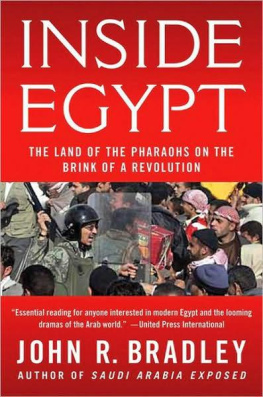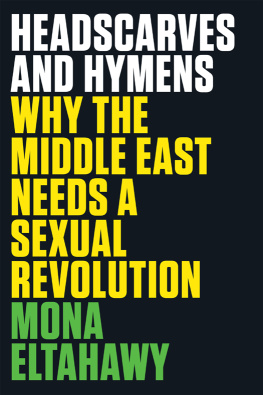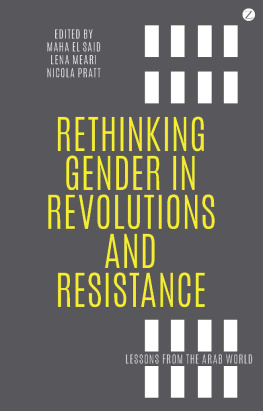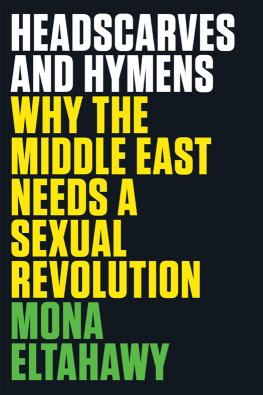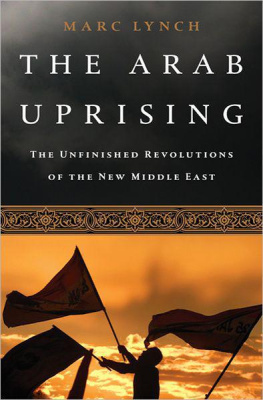AFTER THE
ARAB SPRING
AFTER THE
ARAB SPRING
HOW ISLAMISTS HIJACKED
THE MIDDLE EAST REVOLTS
JOHN R. BRADLEY


AFTER THE ARAB SPRING
Copyright John R. Bradley, 2012.
All rights reserved.
First published in 2012 by PALGRAVE MACMILLAN in the United Statesa division of St. Martins Press LLC, 175 Fifth Avenue, New York, NY 10010.
Where this book is distributed in the UK, Europe and the rest of the world, this is by Palgrave Macmillan, a division of Macmillan Publishers Limited, registered in England, company number 785998, of Houndmills, Basingstoke, Hampshire RG21 6XS.
Palgrave Macmillan is the global academic imprint of the above companies and has companies and representatives throughout the world.
Palgrave and Macmillan are registered trademarks in the United States, the United Kingdom, Europe and other countries.
ISBN 978-0-230-33819-7
Library of Congress Cataloging-in-Publication Data
Bradley, John R., 1970
After the Arab spring : how Islamists hijacked the Middle East revolts/John R. Bradley.
p. cm.
Includes index.
ISBN 978-0-230-33819-7 (hardback)
1. Middle EastPolitics and government21st
century. 2. RevolutionsMiddle East. 3. Islam and politicsMiddle
East. 4. DemocratizationMiddle East. I. Title.
DS63.18.B73 2012
956.054dc23
2011040890
A catalogue record of the book is available from the British Library.
Design by Letra Libre, Inc.
First edition: January 2012
10 9 8 7 6 5 4 3 2 1
Printed in the United States of America.
CONTENTS
INTRODUCTION
AN ARAB SPRING?
MY HEART SANK WHEN NEWS BROKE THAT A POPULAR UPRISING HAD erupted in Tunisia. It was not that I harbored any sympathy for the countrys strongman, Zine El-Abidine Ben Ali, who had been in power for more than two decades. I had still less for his extended family, which had robbed the country blind. Thousands of Tunisians had poured into the streets, and I knew why.
But while most Western reporters considered unrest in the Middle East a step in the direction of democracy, I thought the opposite. It is the Islamists, who wish to create Islamic states and impose Islamic law, who will emerge triumphant from the present chaos.
What happened in Tunisia, the center of the Arab Spring, was repeated throughout the Middle East.
The country was ruled by the most secular Arab regime and was the most socially liberal and progressive Muslim country in the Middle East. As such, before its revolution it had been the last bulwark against the Saudi-funded Wahhabi form of Islam that, since the oil boom of the 1970s, had spread everywhere else in the Islamic world.
Tunisias revolution was spontaneous and lacked any kind of ideological underpinning. Bearded zealots played little, if any, part in the uprising. They were certainly not its driving force. That would be typical of all the Arab revolts, apart from in Libya, at least in their initial stages. In Tunisia, there was a reason that the Islamists were not the vanguard: for decades the regime had imprisoned or exiled them.
However, their hijacking of the revolution did not mark the first time in history that such an upheaval took a disastrous turn. It often happens that the revolutionaries who sacrificed themselves are then dismayed to see their hopes dashed while a new order that is as bad as, if not worse than, the one they ousted becomes reality. The modern eras most popular revolutions offer depressing precedents. The French Revolution led to the Great Terror, the Russian Revolution led to the nightmare of Stalin, and the Iranian Revolution led to the tyrannical rule of the mullahs. The last example is particularly relevant. The 1979 Iranian uprising is the only true revolution (as opposed to military coups) in modern Middle Eastern history. Tunisias Islamists were a minority among the population at large, and they were very much in the infancy of their campaign when the popular uprising started in December 2010. But so were the Iranian mullahs in the early stages of the Iranian Revolution in the 1970s, yet they exploited the postrevolutionary chaos to seize control.
If that were to happen in Tunisia, what lay in store for the wider region? A failed transition to democracy in the most progressive Arab country would bode ill for the possibility of success elsewhere. From Morocco to Yemen, Saudi Arabia to Egypt, secularism and liberalism were already anathema. Wahhabi-inspired Islam already had a firm foothold. Syria, the only ostensibly secular Arab country apart from Tunisia, was ruled by a minority Shia cult, and there, too, the Sunni fundamentalist Muslim Brotherhood was ready to pounce.
Tunisia is little known in the West. Sandwiched between resource-rich neighbors Algeria and Libya, under Ben Ali it had been stubbornly isolationist and mostly stayed out of the regions turbulent politics. Tight restrictions were placed on the foreign media and international human rights organizations: another reason it was not much covered. But even fellow Arabs rarely gave it a second thought, aside from sex-starved Algerian and Libyan men who escaped their stifling societies by descending on the Tunisian capitals vibrant nightlife. For Americans, Tunisia was completely off the radar; Britons knew it only as an affordable, nearby holiday destination. After the revolution, most Western journalists who descended on Tunisia had therefore previously had little reason or opportunity to visit; but before they could get acquainted with its uniqueness, they were rushed off to Egypt to cover the follow-on revolution there.
Much of the excited coverage of Ben Alis ouster willfully misrepresented Tunisias modern history, caricaturing the regime as on a par with other brutally oppressive Arab dictatorships. That was not the reality. Unfamiliarity, too, accounted for an immediate championing of the Tunisian uprising as a thirst for democracy, both within the country and throughout the region. Constant parallels were drawn to the fall of the Berlin Wall and to the end of Communism. Pluralism, tolerance, and free expression, we were told, would finally blossom in this apparently cruelly repressive country, its rich pollen inexorably carried through the Middle East.
When the Western media gets an idea like this into its head, it tends to steamroll. Then it turns into a self-fulfilling prophecy. Few pundits then want to risk alienating their readers and viewers by going out on a limb. I saw firsthand the consequences of doing so when, after Egyptian dictator Hosni Mubarak resigned in February 2011, I appeared on an American news networkhaving written a book, Inside Egypt: The Land of the Pharaohs on the Brink of a Revolution (2008), that predicted the Cairo uprising. We marveled at the million-strong crowd celebrating in the capitals Tahrir Square. However, after I warned of an Islamist takeover in the not-too-distant future, the interview abruptly ended. This was a night, the presenter told me, for celebration. Nobody wanted to hear my doom and gloom, and I was thanked and summarily sent away.
Nobody benefits from such sentimentality.
As Middle Eastern pundits continued their joyous Arab Spring narrative, I did manage to publish a number of articles that warned this Tunisian tsunami would leave in its wake a catastrophic new reality.
For all its history of isolationism, Tunisia was suddenly an Arab country of crucial significance, but for reasons few wanted to discuss. In George Orwells novel


